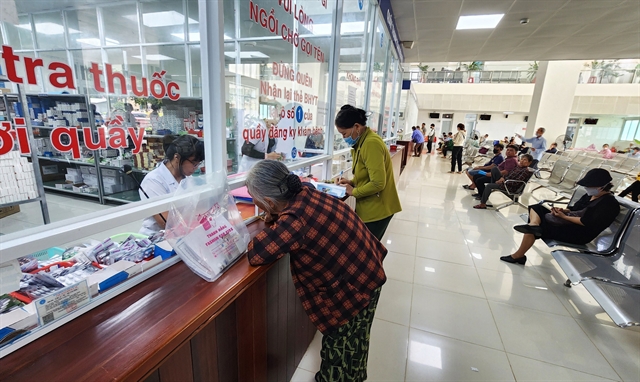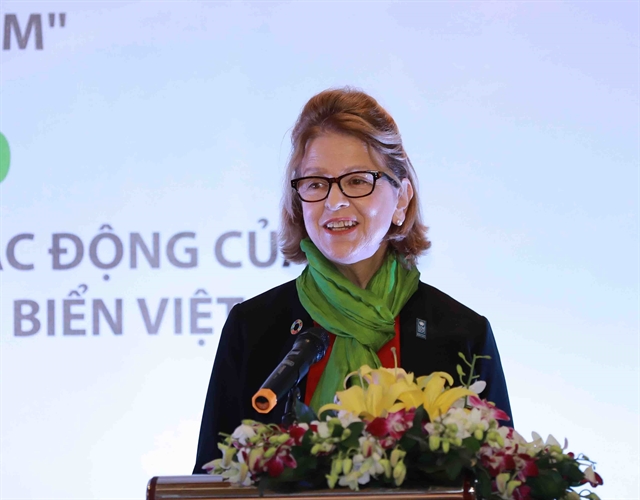 Opinion
Opinion

Today, as we mark the 73rd International Human Rights Day, Việt Nam, as other countries, continues to grapple with the unprecedented challenge of the COVID-19 pandemic.

|
| Caitlin Wiesen, UNDP Resident Representative, Việt Nam. — VNA/VNS Photo |
By Caitlin Wiesen, UNDP Resident Representative, Việt Nam
Today, as we mark the 73rd International Human Rights Day, Việt Nam, just like other countries, continues to grapple with the unprecedented challenge of the COVID-19 pandemic. However, it is important to remember that Human Rights Day was born in an unprecedented time, as nations came together to recover and rebuild from the Second World War. We have learnt that human rights must be at the core of our efforts to build forward better; these fundamental rights give us both the hope and mechanisms to create a more equal, sustainable, and resilient world.
This year, the Human Rights Day theme relates to 'EQUALITY' and Article 1 of the Universal Declaration of Human Rights, “All human beings are born free and equal in dignity and rights.” “All Human, All Equal" is closely aligned with the principles at the heart of the 2030 Agenda of ‘Leaving No One Behind’ and critically, ‘starting with the farthest behind first.’ At the Industry 4.0 Summit earlier this week, Prime Minister Phạm Minh Chính noted that ensuring the well-being of 100 million people was what human rights meant for Việt Nam. He highlighted the importance of putting people at the centre, as the subject, the goal and the driving force of development. Who better to realise this vision than the young people of Việt Nam?
Young people have consistently shown that they are able to bring new perspectives and innovative, rights-based solutions to address the world’s most pressing challenges, such as health crisis, climate catastrophes, bridging the digital divide and reaching the most vulnerable and deprived. What they often lack, however, are the tools and platforms to ensure that their voices can be heard, where their vision can help shape the policies that will affect their lives, and where their ideas can be tested and scaled. Human rights education is a powerful instrument to help youth overcome these hurdles.
UNDP is committed to both ensuring that young people are well-equipped to speak up, and that their voices are amplified. In 2021, UNDP Việt Nam worked with its national partners to reintroduce the Room XX programme. This intensive online educational programme – named after the room at the UN Human Rights Council where the Universal Periodic Review (UPR) takes place – taught 80 diverse young people across the country about universal human rights and the UN mechanisms that promote and protect the rights. These youths then gained the necessary skills to apply that knowledge in a simulation of a UPR session. Participants showed dedication and enthusiasm in immersing themselves in this much-needed platform to foster human rights dialogue in Việt Nam.
Today, these youths shared their human rights vision for Việt Nam at an annual Human Rights event organised by the Ministry of Foreign Affairs and UNDP. They also offered input on the Government’s draft voluntary UPR Mid-Term report, which sets out the progress the country has made in implementing UPR recommendations. They showed an understanding of the challenges that Việt Nam faces, and it was inspiring to hear of the many solutions they are ready to offer.
Human rights education is an enabler for youth empowerment across all areas of life. For example, young people have taken the initiative in promoting LGBTIQ+ rights. At a UNDP-organised event at the 2021 Stronger Together Summit, youth shared exciting ideas regarding social impact projects and enterprises. In the Youth Digital Citizen Challenge 2021, young people pitched technology proposals to improve access to e-services in Hà Nội. Business and human rights are also being introduced and integrated into business school curricula in Việt Nam. Moreover, youth submitted a report on climate action in Việt Nam to the COP26 President.
These innovative projects offer opportunities to build on the experiences, and for Việt Nam to develop and share best practices in human rights education in multilateral forums. Việt Nam has been nominated as ASEAN representative to the Human Rights Council for the term 2023-2025. Becoming a member of the Council is an opportunity to be a leader in different areas, such as advocating for rights-based approaches to responding to crisis, combatting climate change, and addressing issues related to women, peace and security.
The long-term impact of the COVID-19 pandemic will be felt most by those growing up in its shadow now. However, UNDP’s partnerships with young people have shown that – if given the tools that human rights education offers – they are more than ready to contribute to the future of the planet. One where every person is equal in dignity and respect, and where diversities are embraced and valued. A just, inclusive future, where human rights are not just celebrated on December 10, but experienced every day as a lived reality. — VNS




